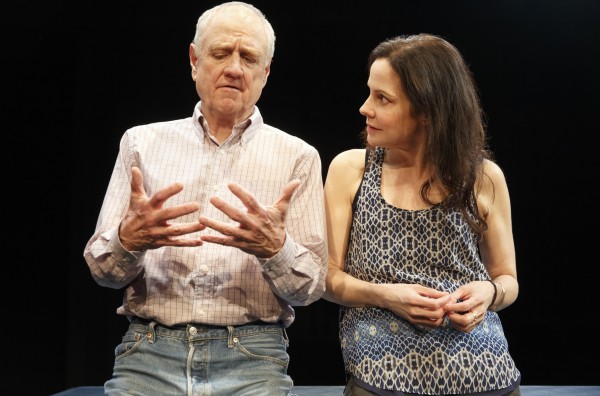Not being a serious science student, my only knowledge of Werner Heisenberg, the German physicist, is that he is a character in Michael Frayn’s Tony-winning Copenhagen. So I walked into Simon Stephens’ play at Manhattan Theatre Club’s studio space in City Center, which bears his name with little knowledge of the scientist’s connection with the material. It turns out to be a tenuous one in a slight work rescued by two committed performers.
Heisenberg himself is never mentioned, but one of the characters explains his Uncertainty Principle which posits that if you try to measure an object’s trajectory, momentum or position, you will change those qualities. That character is Georgie (an electric Mary-Louise Parker), a 40-ish American woman living in London, and the brief play follows her growing bond with the 75-year-old Irish butcher, Alex (a solid Denis Arndt), from chance encounter to romantic affection. Stephens appears to be saying if you try to examine or evaluate a relationship, you alter it. What an insight (sarcasm intended).

Credit: Joan Marcus
Heisenberg is one of a group of recent British imports, including Nick Payne’s Constellations and Jez Butterworth’s The River, of short length and little impact bolstered by star performances. Not much happens in the play’s 80 minutes. Georgie meets Alex when she impulsively kisses the back of his neck at a train station. They go to dinner and become unlikely lovers. She asks him for a large sum of money so she can find her estranged adult son in New Jersey. There’s a little conflict over this but he finally concedes and accompanies her. In their hotel room, they agree to continue seeing each other. That’s it. Fine for a short story, but the play feels incomplete. For instance, we learn little about Georgie’s relationship with the son or why he ran away from her and the dynamics of the age difference between the two protagonists is hardly addressed.
Georgie is one of those vibrant, attractive kooks that seem to exist only in plays. She thinks nothing of telling her life story, which turns out to be a fabrication, to a total stranger. (Why she lies at first is also never gotten into. She later gives Alex the real story.) Alex is an equally clichéd counterpart, the isolated bachelor brought out of his shell by the quirky, but exciting younger woman. The flimsy play is a disappointment, given Stephens’ brilliant stage adaptation of The Curious Incident of the Dog in the Night-Time and his moving Bluebird, seen at Atlantic Theater Company a few seasons back.
Director Mark Brokaw gives this acting exercise its best possible production, staged tautly with audience members on both sides of a strip of playing space. The simple set is by Mark Wendland and telling lighting by Donald Holder. Parker and Arndt give their roles weight and depth. Georgie could have been an obnoxious flake, but Parker makes her endearing. Arndt, a veteran of the Oregon Shakespeare Festival and several regional theaters, lends dignity and intelligence to a role which might have played second fiddle to the more eccentric Georgie. These two skilled actors prove a theatrical version of Heisenberg’s principle that by examining and enriching a thin play, you alter it for the better.
June 3—28. Manhattan Theatre Club at NY City Center Stage II, 131 W. 55th St., NYC. Tue.—Sat., 7:30 p.m.; Wed., sat., Sun., 2:30 p.m. Running time: 80 minutes with no intermission; $30—$75; (212) 581-1212 or www.nycitycenter.org.
This review previously appeared on ArtsinNY.com and Theaterlife.com.
